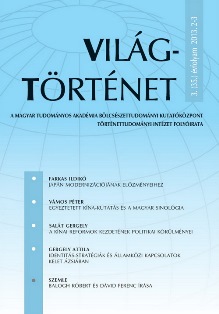A modern mongol állam kezdetei. Mongólia önállósodási törekvései a 20. század második évtizedében
The Beginnings of the Modern Mongolian State: The Quest for Independence in the Early 20th Century
Author(s): Zsolt SzilágyiSubject(s): History
Published by: Magyar Tudományos Akadémia Bölcsészettudományi Kutatóközpont Történettudományi Intézet
Summary/Abstract: Mongolian independence and the present-day Mongolian state owe their existence, to some extent, to their Northern neighbour. At the beginning of the 20th century Mongolia was a part of the Manchu Empire. In 1911 when the dynasty collapsed, the Mongolians made an attempt at independence. In that year the Mongolian State proclaimed its independence and the 8th Bogd gegen occupied the throne, but their declaration was not accepted by either Russia or China, nor by any other country. They were able to attain a partial autonomy only with the help of the Tsarist administration what their Southern neighbour was also willing to endorse in 1915. This is partly due to the fact that an unstable internal political situation and the lack of a unifi ed government had so enfeebled the power of China by the aftermath of the Manchu dynasty, that both the Tsarist regime and later the Bolsheviks were able to enforce their interests in the Mongolian areas. Between 1911 and 1919 by the transformation of state organization the Church obtained a total influence in the leadership of Mongol State. In 1914 Ministry of Religion was founded which became the most important governmental organization and also the leader and controlling unit of the internal politics. In 1917, after the fall of the Tsar, the theocratic Mongolian government lost its chief supporter and the country was compelled to give up its autonomy. Chinese rule returned, but this only proved, in the event, a brief intermezzo. In 1921 the Mongolians expelled the Chinese in an armed conflict with Bolshevik assistance and the regime which now came into power created its new structures of leadership step by step relying on the effective help and following the practical guidance of the Northern neighbour.
Journal: Világtörténet
- Issue Year: 2013
- Issue No: 2-3
- Page Range: 333-363
- Page Count: 31
- Language: Hungarian

